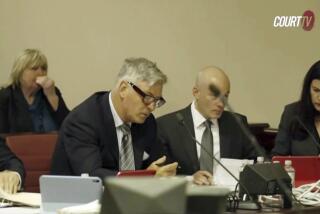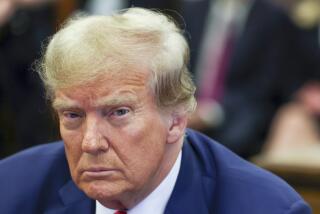Steele Case Goes to Jury; Defense Calls No Witnesses
- Share via
ALEXANDRIA, Va. — Jurors began their deliberations Thursday in the obstruction trial of Julie Hiatt Steele after the defense surprised the courtroom by resting its case without calling a single witness.
Attorneys for Steele, who is accused of covering up President Clinton’s alleged groping of her former friend Kathleen Willey at the White House in 1993, decided not to put on a defense because they believe Willey’s credibility was badly damaged during Wednesday’s cross-examination, sources close to Steele said.
The defense had a handful of witnesses ready to go Thursday, and Steele herself told her attorneys that she wanted to testify.
But defense attorneys decided to change course, finalizing their strategy Thursday morning even as prosecutors from independent counsel Kenneth W. Starr’s office were wrapping up their three days of witnesses.
Putting Steele on the witness stand would have given prosecutors another chance to probe issues that could prove damaging to her, including why she decided to sell photos of Willey and Clinton to the tabloids.
And defense attorneys wanted Willey’s Wednesday testimony, including her acknowledgment of numerous contradictions and lapses of memory in her story, to remain fresh in jurors’ minds.
“It’s not going to get much better [for Steele] than that. You want to put as little distance between that and the jury as you can,” said one source close to the defense, who asked not to be identified.
Steele faces up to 35 years in prison if convicted in U.S. District Court on three counts of obstruction of justice and one count of making a false statement regarding Clinton’s alleged groping of Willey.
In a 1997 interview with a Newsweek reporter, Steele backed Willey’s account of the incident.
In later interviews with authorities and in grand jury testimony, however, Steele recanted her story, saying she knew nothing about the episode. Starr’s office maintains the second version is a lie.
In closing arguments, associate independent counsel Stephen Binhak said Steele not only sought to cover up what she knew about the incident, but also had tried to influence the testimony of other witnesses.
The motive, he said, was money and publicity, as Steele sought to market her story and the Willey photos to national publications.
But in her closing argument, defense attorney Nancy Luque mocked that line of reasoning. If Steele’s motive was to make money, she was sitting on a “gold mine” by simply repeating lurid details about Clinton’s conduct, Luque said. It “defies common sense” to think that Steele could make herself more marketable by actually denying the episode, she added.
Prosecutors “didn’t even try and find the truth here,” she said.
More to Read
Sign up for Essential California
The most important California stories and recommendations in your inbox every morning.
You may occasionally receive promotional content from the Los Angeles Times.













